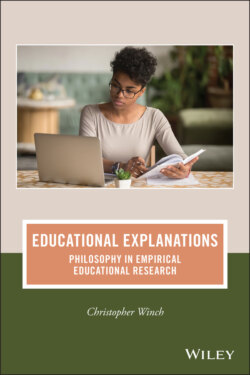Читать книгу Educational Explanations - Christopher Winch - Страница 16
2 A Criterial Conception of Truth and Objectivity: Its Relevance to Educational Research INTRODUCTION
ОглавлениеEmpirical educational research (EER) lies in the region of social science. As such, many of the problems and disputes concerning its aims, presuppositions and methods are held in common with the other social sciences. It is, however, distinctive in three ways. First, although there is a field of study, namely educational practices in all their variety, there is no distinctive educational methodology for investigating them. Typically EER uses a selection of sociological, economic, historical or psychological methods whenever they are thought to be appropriate. Second, philosophy has always been one of the central educational disciplines and, even if empirical researchers try to ignore the philosophical issues that arise in the interpretation of central educational concepts, those which structure our understanding of education (see Ch. 1), that does not mean that they go away. Finally, EER usually has a practical objective based loosely around the idea of improving an educational practice or educational performance. These three features make it distinctive among the social sciences. In what follows, some issues will be peculiar to education while others apply more generally to the social sciences.
One of the greatest challenges in outlining a systematic enquiry into human practices is to commit oneself to pursuit of the truth, not just in a quixotic sense, but in a way that is responsive to a set of demands that arise outside the opinions and desires of researchers; in other words, a set of demands that are objective rather than subjective. Failure to do this can lead one either into the pursuit of an impossible ideal of truth that can never be attained and thus lead to disillusionment and scepticism, or it can lead to an abandonment of the search for objectivity and a lapse into a validation of a more or less subjective view of what constitutes truth. In the following section, such an objective but non-absolutist view of the conception of truth proper to empirical educational enquiry will be set out. This is particularly important as the reality of different and often contesting perspectives on educational phenomena is such an important element in educational research and it needs to be acknowledged without surrendering to subjectivism, even in a disguised form. Subsequent to that, a suggestion for how to deal with the reality of multiple perspectives can be attained without a commitment to multiple realities.
